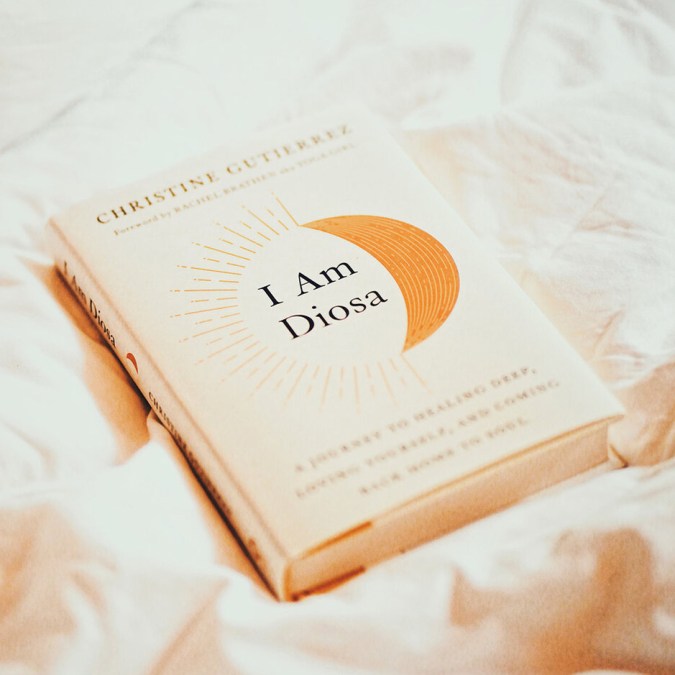The United States is experiencing a mental health crisis. For decades, depression has been on the rise and suicide rates were at a record high in 2019. Now, due to the COVID-19 pandemic and its effects (hundreds of thousands of deaths, skyrocketing unemployment, etc.), anxiety and despair are widespread. People are starving for connection, but with necessary stay-at-home directives and mandatory mask orders, many of us are experiencing a vastly changing world alone. Author and licensed psychotherapist Christine Gutierrez is hoping to help people through the long, and often onerous, journey of healing, self-love and reclaiming one’s worth.
Her debut book I Am Diosa, published on Tuesday Aug. 25 by Penguin Random House, merges ancestral wisdom with psychology to provide readers with tools to become a healthy version of themselves. Through prayers, mantras, meditations and guided journaling prompts, the Brooklyn, New York-raised Puerto Rican life coach guides readers through what she calls soul work. She warns, however, that this book, just as the journey toward healing, isn’t quick and isn’t a substitute for one-on-one professional help.
“When we claim our worth, we remember how powerful we are,” Gutierrez tells Remezcla.
“We remember that we are divine. We remember that we are deserving of good and healthy things. We live in alignment with what our highest self has for us. We speak our truth. We have healthier relationships. We go after our dreams.”

Overall, Gutierrez hopes I Am Diosa helps people—particularly Latinas and women of color who aren’t often represented in spirituality and self-help genres—feel seen, heard, validated and supported.
“They are worthy of their healing, they are worthy of being loved… and they can connect to that deep in-their-bones feeling of self-love,” she says. To assist those interested in reclaiming their worth, Gutierrez shares some key steps and exercises that can help support them on their path:

Recognize All the Ways You Don’t Feel Worthy
“Before we can get to the goal, we have to look at the shadows. We have to look at the places that are making us feel stuck, or blocked or hurting. Those emotional wounds that need to be loved. If we want worthiness, we have to look at the thoughts, actions, behaviors and people in our life that are making us feel unworthy.”

Identify The Unhealthy Decisions You Make When You Don’t Feel Worthy
“Do you have people in your life who speak down to you, who don’t honor you as the diosa that you are? There are steps to be taken to set boundaries or to remove yourself from those relationships in a way that’s healthy for you. But instead, people often make decisions that make them feel less worthy. Maybe you’re acting out by numbing yourself or sleeping with people who don’t serve you. That’s coming from that place of unworthiness. So looking at all the ways that we are seeing or that we are accepting or that we are feeling unworthy is necessary to get closer to your worthiness.”
Try the Proactive Formula
“The proactive formula is based on Kabbalah, which is Jewish mysticism. The first part of the formula is to pause and recognize your reactive behavior. The second one is to realize that your reaction to the problem is the actual focus, focusing on how you can heal your reaction. Next is recognizing that this situation is coming from this place of a lesson for you to choose something that is better for you. Lastly, it’s asking the divine—or a higher power, or your higher self, or whatever you want to call it, your soul — to give you a solution that’s proactive rather than reactive.”

Use Pattern Interrupters
“Something that can help you reduce your reactivity from the moment a reaction comes into your life is a pattern interrupter: inserting a prayer, taking a walk [or] calling a good friend of yours that you can trust. It’s about doing something that will reduce the probability that you are going to react in a negative way. Let’s say someone’s trigger is they go back to this toxic guy who keeps on texting them who they know is not for them and keeps bringing down their worth, but they keep responding. Instead, you recognize the pattern, you observe, you go through that proactive formula, and then you do one proactive step, one pattern interrupter, that might make you pause before you text that person. So little by little, you start building those muscles so that you can start making choices that are more aligned to your higher self, your divine diosa self, versus that reactive unhealthy part of you.”

Get Professional Support
“We are pivoting into a new way of relating with people that’s more digital, and I think that we need more than ever a support system that allows us to have coping skills. This is a time for people wondering about therapy to try it out. We need to destigmatize mental health, depression and suicidal ideation, and get consistent support… When change happens, we need something to ground us. I pray that this book will be a tool during these times so that we can continue to have the support and exercises to help us manage our emotions in a healthier way.”
Turn to Ancestral Wisdom and Medicine
“It’s in the merging of the spiritual and the psychological worlds that we see so much more success. We know now that so much of what was deemed woo-woo spiritual practices that were passed down from our ancestors are actually proven now to be effective in science: working with the earth, praying [and] meditating. The white man in traditional psychotherapy, which is where a lot of our therapeutic principles come from, dismissed all of these things, but now we see that science is backing these practices. We know that there is power in meditation, that there is power in breathing exercises [and] that there is power in connecting with the earth.”
“I Am Diosa” is available for purchase where books are sold.





